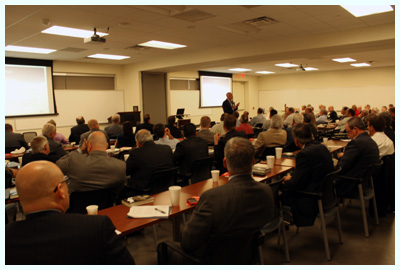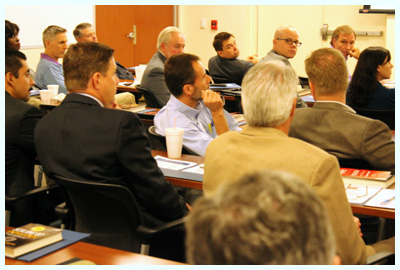 Brent Smith, PhD gave a stimulating presentation titled Managing Talent: Myths and Realities at the 2014 fall conference hosted by Kiley Advisors. Pat Kiley introduced the Rice University dean and professor with a mention of the companies who have hired Dr. Smith “to help them with talent development and leadership coaching” including ExxonMobil and other companies who are the “who’s who of the energy industry” as well as those from other industries such as Microsoft.
Brent Smith, PhD gave a stimulating presentation titled Managing Talent: Myths and Realities at the 2014 fall conference hosted by Kiley Advisors. Pat Kiley introduced the Rice University dean and professor with a mention of the companies who have hired Dr. Smith “to help them with talent development and leadership coaching” including ExxonMobil and other companies who are the “who’s who of the energy industry” as well as those from other industries such as Microsoft.
Dr. Smith began his presentation by confessing that his original training was not in business, but that in fact he is a psychologist. He believes, however, that this training makes him “uniquely qualified to think through this issue of talent, because at the end of the day the factors that are most interesting to companies are the factors that are focused on the psychology related to attracting and retaining the best quality talent in the industry.”
In his interactive presentation, Dr. Smith posed several questions to the assembled group of business leaders about “organizational perspective on practices related to managing talent” in the form of a True/False quiz. As he presented each statement, he asked the group to indicate whether the statement was true or false. Everyone quickly learned that many of the answers which appeared obvious at first, were actually negated by the research and studies which Dr. Smith then revealed. He said that his main thesis is that “the more sophisticated you are in thinking about the practices that you use to manage talent, the more effective you will be at attracting and maintaining it.” Later in his presentation, Dr. Smith stated, “Overwhelmingly, the practices and procedures that organizations use to hire talent are oftentimes the ones that are the least valid at predicting actual success and productivity of employees.”
Later in his presentation, Dr. Smith stated, “Overwhelmingly, the practices and procedures that organizations use to hire talent are oftentimes the ones that are the least valid at predicting actual success and productivity of employees.”
While talking about factors which motivate today’s employees to remain committed to the companies for whom they work, Dr. Smith made the following observation:
“In the energy industry, over the last five years I have seen six or seven surveys that have been done – some by the majors, some by mid-size exploration and production companies, some by services companies – that have focused on trying to understand what drives the next generation of employees, because they seem to be a little bit different than older generations of employees. What is really quite striking is that [the surveys] all tend to yield the same conclusion to the question ‘What motivates or creates that commitment [of an employee toward his employer]?’ The top three, and usually in this order, are
- development / investments in people,
- appropriate work/life balance, and
- compensation.”
One very interesting topic he talked about was the correlation between the general opinion among employees that good leadership is a skill that can be learned by individuals and the financial success of the company for which they work. He said:
“The organizations in which you had a lower percentage of people believing that leadership could not be trained (in other words, you had a higher percentage of people believing that leadership could be) those organizations financially outperformed the others, and they did so even against others within their own industry. That was actually the most interesting part of the study. The lower that percentage, the better financially performing those organizations were, and were across time. So the more people you have in your organization believing that leadership could be developed, then the better financially performing [your company] was.”
His fascinating presentation can be viewed in its entirety in the following two videos, with a total length of 56 minutes.
Dr. Smith is currently Associate Dean of Executive Education and Associate Professor of Management and Psychology at Rice University. He has also been a faculty member at London Business School and Cornell University where he taught in the School of Industrial and Labor Relations and the Johnson Graduate School of Management. He has conducted executive workshops for such companies as ExxonMobil, Shell, IBM, Microsoft, El Paso Energy, KPMG and many more.



Add new comment